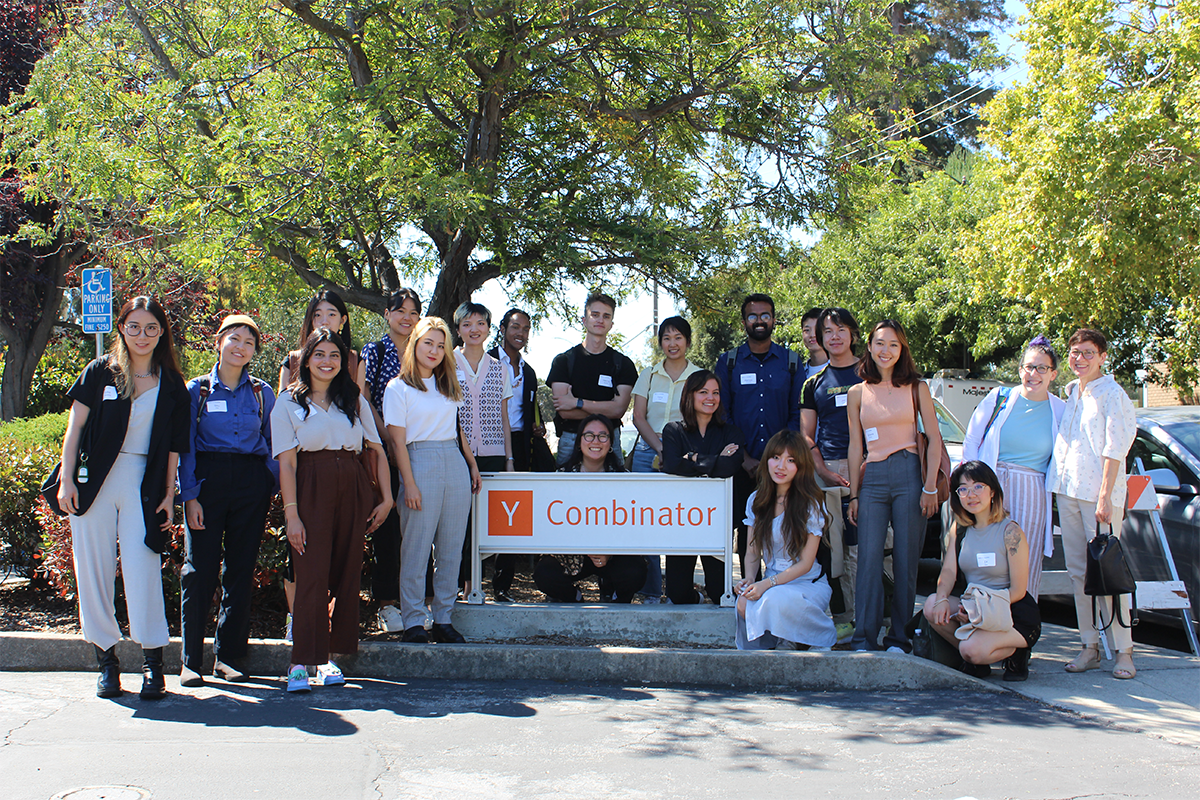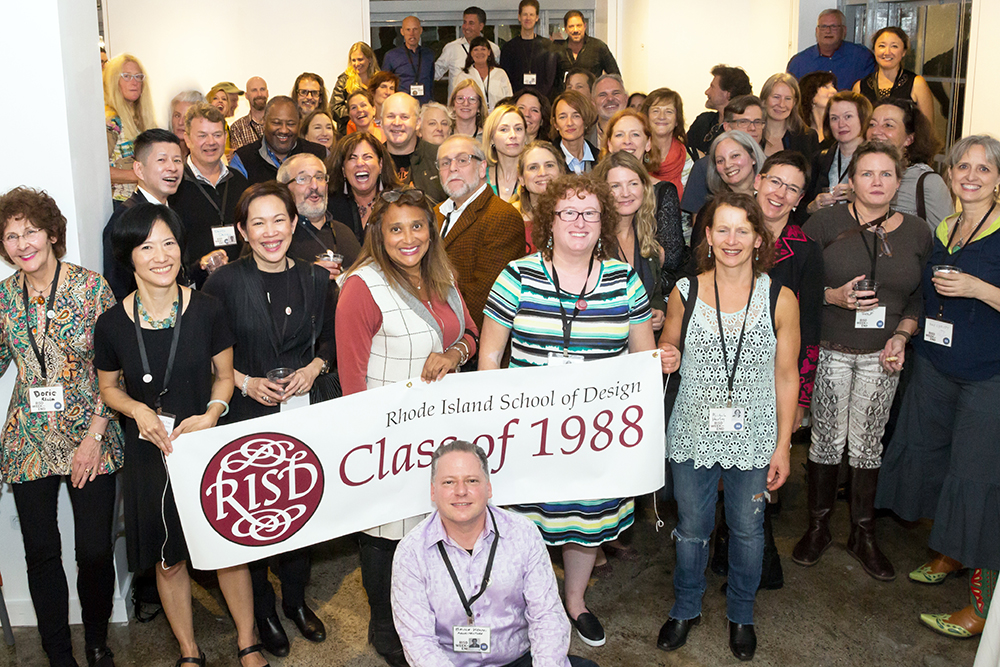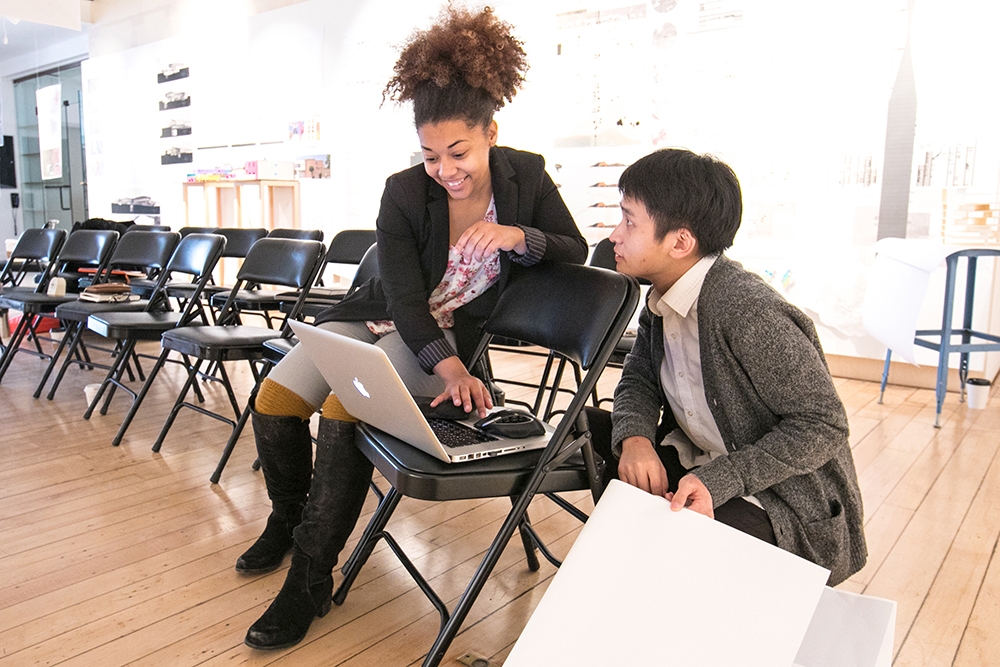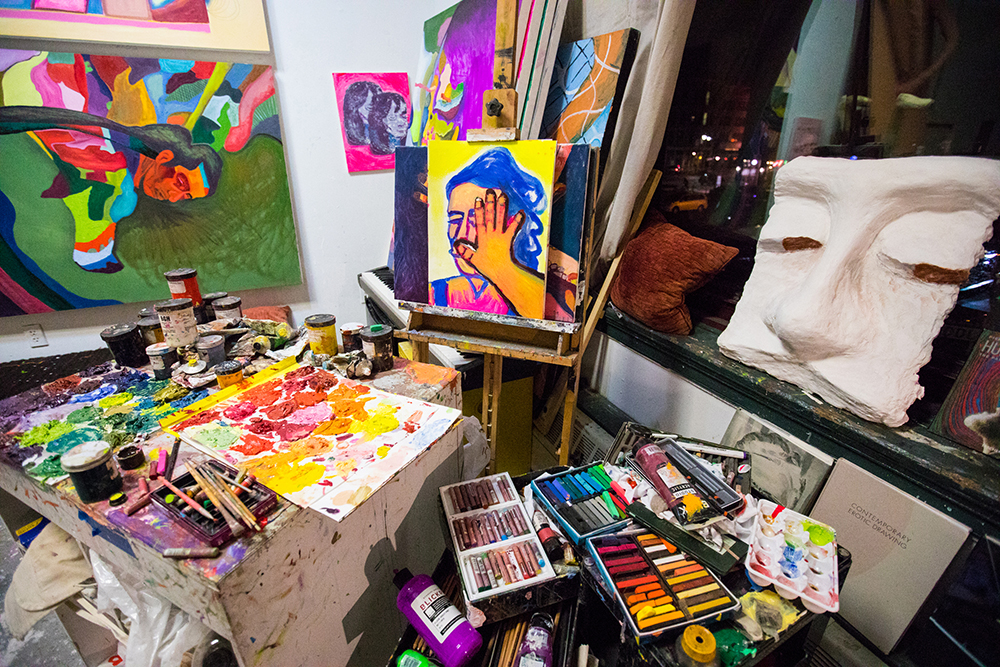
Tech Trek Takes RISD Students to the Heart of the Bay Area’s Tech Sector
With donor support and the help of alumni volunteers, RISD students get up close and personal with major players in tech.
What are the working habits of creatives who work in tech? What are the company values that shape how decisions are made? What makes a candidate stand out when applying for a job at a major tech company?
These are some of the many questions RISD students hoped to answer by participating in Tech Trek, a weeklong career development program held in late August that provided 20 undergraduate and graduate students with the opportunity to explore the tech industry and culture in the Bay Area. Helping guide them were over 38 RISD alumni—with graduation years ranging from 1979 to 2021— who volunteered their time and resources so students could better understand what it looks like to be a creative in tech.
Alumni including RISD in Tech affinity group co-leaders Jonathan Arena 09 GD, director of design at Patreon, and Mike Neff 04 PH, director of product design at UserTesting, arranged on-site visits for the students at Googleplex, Patreon, Airbnb, Figma, Meta and Y Combinator.
They also hosted portfolio reviews, panels with alumni and networking opportunities.
“I don’t think I’ve come across another experience like this where you can get such a broad spectrum of insights,” Arena said, noting that the trip included learning about “some of the largest companies on the planet,” as well as newer, smaller companies.
Tech Trek is offered through a partnership between the RISD Alumni Association, the RISD in Tech alumni affinity group, the RISD Alumni Club of San Francisco and the RISD Career Center. It was powered by a gift from a RISD parent and additional support from donors |that covered all student costs, including travel.
“This unique exposure offers a holistic view of the industry,” said Susan Andersen, associate director of the RISD Career Center. “Students learn what it takes to be successful as a recent graduate in tech, how to engage with these companies for job and internship opportunities and how to develop and grow a network of industry professionals and mentors that will support students’ success as emerging professionals.”
In a recent survey of the top 10 employers of alumni, five were technology firms. Arena said the journey after graduating from RISD can be challenging, and as the tech industry has grown larger and more complex in recent years, Tech Trek offers a way to explore the powerful connection between alumni and students and offer a roadmap that was not available to him as he was starting out.
“Those connections for students can be invaluable and can really give them a head start, information and access to opportunity that continues beyond their RISD experience,” he said. “It can make their entrance into the professional world a lot more hospitable and easier to navigate.”
For Ju Yeon JoAnne Lee 23 TX, getting to know the personality, environment and atmosphere of each company was exciting. While it was fun to see trees growing inside (Meta) or learn about perks like on-site massages (Google), most valuable to Lee was the chance to connect with both alumni and her peers, with whom she would stay up talking until midnight after each day’s programming.
“Most memorable trips or experiences come from the people you meet,” Lee said. “And the fact that we already have this connection of being from RISD, the conversation was just so easy… the alumni were able to understand where I was coming from and give great advice and mentoring that will help me navigate my career.”
For Lee, that included talking with an alumna who develops sustainable textiles for athletic wear about Lee’s own work in that area and what the future may hold for the sector overall. Lee also got advice on the best way to publish—and protect—her research on fabrics that incorporate emerging technologies.
Lee said that like many artists, she has made a habit of sharing her work openly. However, because she is developing novel textiles that incorporate multifunctional fibers, including fibers with wires and chips that enable audio or photo memory storage, the issue of proprietary knowledge and credit is increasingly important. Having an alumna advise on best practices gave her an immediate path forward.
On the trip with Lee was Jon Chen 23 SC, who is pursuing a concentration in Computation, Technology and Culture, where students assess the history and theory of computational platforms and technology and learn how to code, create software and program machines for making works of art and design.
Chen originally was slated to go on Tech Trek in 2020, when the program had to be canceled due to the COVID-19 pandemic. They took a year off and worked at Google Creative Lab. Chen has also interned with the Research and Development team at The New York Times, exploring how emerging technologies can be applied in service of journalism, and with the creative firm Something Special Studios.
“This year, going on Tech Trek came as a huge surprise and I was fortunate enough to have experienced two and a half years of growth in between [the planned program and the actual trip],” Chen said. In addition to visiting companies and engaging with panels on subjects like artificial intelligence, students were encouraged to ask themselves big questions about their future and their motivation.
“Do you want to play a direct role in shaping the software that people use? Do you want to help people imagine the future? Do you want to get involved in the ethics and the psychology of tech? The sooner you learn what you want your place and role to be, the sooner you can realize what your place in the tech industry might be,” Arena said. “This was an opportunity to help students think that through.”
Looking ahead, Chen said they are not sure what path they will take after graduation. “But this trip has given me enough perspective to understand that the future of my work can contain multitudes regardless of the specific journey,” Chen said.
For Arena, Tech Trek is a model not just for tech but for other alumni-student career development programs. “If we keep pushing and keep exploring, what could Tech Trek turn into? That is what I’m most excited about. Tech Trek could evolve into different disciplines,” he said, like fashion, filmmaking or other industries, “and could be really an amazing window into building that strong bridge between RISD alums and the industries that we choose to work in.”
Lee said that, if she were not graduating in May, she would sign up for Tech Trek again. “Honestly, if someone asked, ‘what was your most memorable RISD experience?’ Tech Trek would be the top,” Lee said.
Student Spotlight
How does one arrive at the intersection of textiles and computing, and what happens there?
In the fall semester of her junior year, Ju Yeon JoAnne Lee 23 TX began thinking about her senior show and asked herself what it means to be a textile designer. Lee, who is pursuing a concentration in Nature-Culture-Sustainability Studies alongside her textiles major, was keenly aware of textile manufacturing’s negative environmental impact, from microfibers and chemical fabric finishers that pollute water systems to the waste produced each year by garments that do not decompose when discarded.
Thinking about how to make people value clothes more instead of wearing clothes for one season and throwing them out, Lee said she began experimenting with making multifunctional clothing with computing capabilities. If clothing could shapeshift, have architectural properties or perform functions associated with smartphones, that clothing might not be thought of as disposable. Lee took the course “Computing Fabrics,” which RISD is co-developing with MIT, and where fabric materials are considered part of a computational environment.
Now, Lee is a teaching assistant for Yoel Fink, the MIT materials science professor who leads the course. She has worked on fabric that responds to a pneumatic composite and that can “inflate,” and envisions possibilities for textiles with architectural functionality



